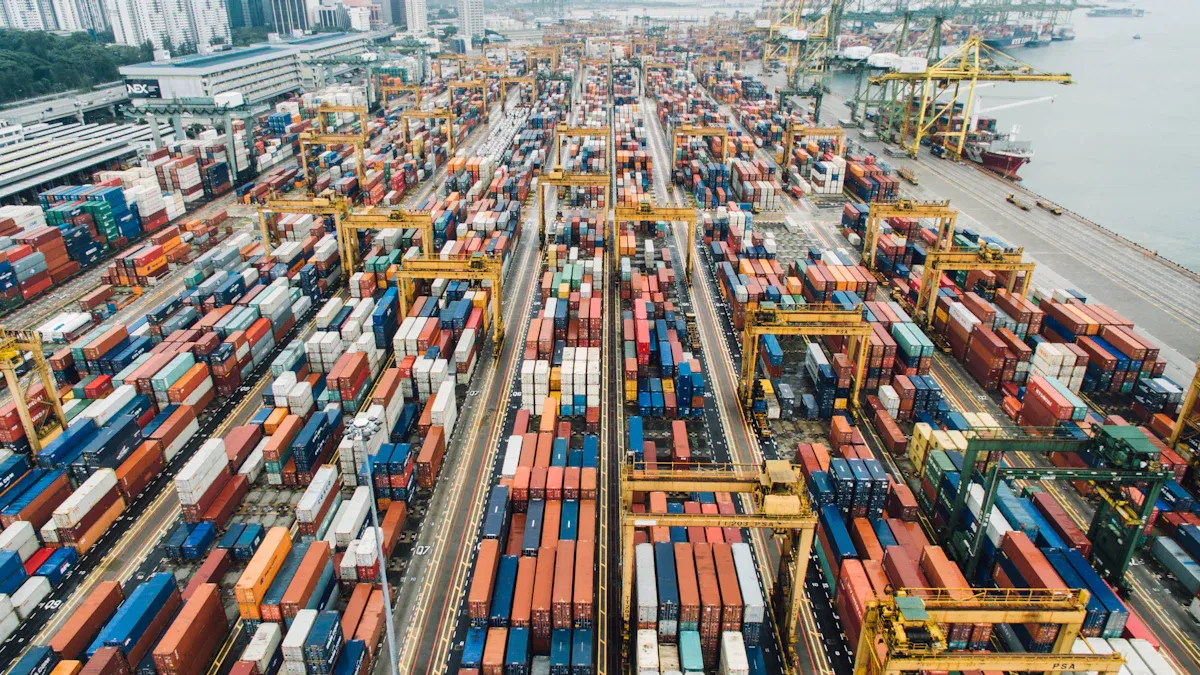How to Choose the Right Logistics Company for Your Business in 2025

When you start looking for a logistics partner in 2025, focus on these logistics company selection criteria:
Expertise and industry knowledge
Reliability and track record
Technology capabilities
Global network and reach
Scalability and flexibility
Take a moment to clarify your business needs, shipment details, and the services you want. Companies that use automation, AI, and green logistics stand out. Strong technology, honest communication, and specialized solutions help you avoid costly mistakes and unreliable partners.
Key Takeaways
Define your business needs clearly. Understand your shipment volume and dimensions to find a logistics partner that fits your specific requirements.
Look for a logistics company with a strong reputation and proven experience. Check for industry awards and customer testimonials to ensure reliability.
Choose a provider that uses advanced technology. Systems like TMS and WMS improve tracking, reduce costs, and enhance overall efficiency.
Ensure the logistics partner offers customizable services. A flexible provider can adapt to your unique challenges and growth needs.
Prioritize sustainability in your logistics choice. A partner committed to green practices can help reduce costs and improve your brand image.
Define Your Needs

Shipment Volume and Dimensions
Before you start comparing logistics providers, look at your shipment volume and the size of your packages. If you ship a lot of products or have items with unusual dimensions, you need a provider that can handle your specific needs. In 2024, transportation costs made up more than half of total logistics expenses worldwide. You can save money by optimizing your packaging. For example:
Companies that use cartonization can cut freight costs by 10% to 25%.
Standardizing box sizes can lower packaging costs by 12% to 18%.
A distributor in the Northeast U.S. reduced shipping costs by 16% and boosted productivity by 20% by optimizing shipment dimensions.
Ask yourself: Do you ship small items in bulk, or large, odd-shaped products? The answer helps you narrow down your choices.
Required Services and Specialization
Think about the types of services you need. Some businesses require special handling, while others need basic shipping. Common specialized logistics services include:
Cold chain logistics for perishable goods like food or medicine.
Hazardous materials transport for chemicals or dangerous items.
Project logistics for oversized or complex equipment.
Check if your provider offers customizable services and has the right credentials. Delivery metrics matter, too. They show if shipments arrive on time and in good condition. Providers with strong credentials can handle complex regulations and keep your shipments safe.
Local vs. National Expertise
Decide if you need a local expert or a national provider. Here’s a quick comparison:
Aspect | Local Providers | National Providers |
|---|---|---|
Customer Relationships | Closer, more responsive support | Larger scale, less personal interaction |
Service Personalization | Tailored services | Rigid processes, less flexibility |
Economic Impact | Supports local communities | Less direct local impact |
Cost Efficiency | Higher costs for lower volumes | Discounted rates, bulk processing |
Technology Utilization | May lack advanced technology | Uses cutting-edge logistics technology |
National providers often run large warehouse networks and offer fast delivery, sometimes within two days. They also negotiate better rates, which can lower your costs. Small businesses may pay more for shipping, while large companies get volume discounts. Your choice depends on your business size and goals.
Remember, defining your needs is the first step in applying logistics company selection criteria that fit your business.
Logistics Company Selection Criteria
Choosing the right partner can make or break your supply chain. Let’s break down the most important logistics company selection criteria so you can make a smart decision.
Experience and Reputation
You want a logistics partner with a proven track record. Experience matters because it shows the provider knows how to handle challenges and deliver on promises. Reputation tells you how others feel about their service. When you look at logistics company selection criteria, always check both.
Here’s a quick way to see why experience and reputation matter:
Key Findings | Description |
|---|---|
High service quality leads to happy customers. | |
Customer Satisfaction and Re-use | Satisfied customers come back for more services. |
Importance of Provider Experience | Experienced providers deliver better results and more reliable performance. |
You can spot a reputable company by looking for industry awards and certifications. These honors show that a provider stands out from the crowd. Here are some top awards you might see:
Year | Award Name | Description |
|---|---|---|
2025 | Global Trade Magazine Top 150 3PL | Recognizes top third-party logistics providers. |
2025 | Inbound Logistics Top 100 3PL Provider | Acknowledges leading 3PL providers. |
2025 | Transport Topics Top 100 Logistics Company | Highlights top logistics companies. |
2025 | Inbound Logistics Top 100 Logistics IT Provider | Recognizes top logistics IT providers. |
2025 | Newsweek Excellence 1000 Index | Acknowledges excellence in various sectors. |
2024 | Certified Great Place to Work | Recognizes outstanding workplace culture. |
2024 | Inbound Logistics G75 Green Transportation Partner | Honors eco-friendly logistics companies. |
2023 | Plastic Neutrality Certification | Shows commitment to sustainability. |
2022 | Heavy Lift Awards Airfreight Solution of the Year | Recognizes airfreight excellence. |
2021 | Inc. Best In Business List | Highlights positive business impact. |
Tip: Ask for case studies and testimonials. Read third-party reviews. These give you a real look at how the company performs and treats its customers.
You can also check for special awards like the EPA SmartWay Excellence Award or the Gartner Supply Chainnovator Awards. These show a provider’s commitment to quality and innovation.
Technology Platforms (TMS, WMS)
Technology is a game-changer in logistics. When you compare logistics company selection criteria, look for companies that use advanced platforms like Transportation Management Systems (TMS) and Warehouse Management Systems (WMS). These tools help you track shipments, manage inventory, and keep everything running smoothly.
Here’s what these platforms can do for you:
Benefit/Feature | Description |
|---|---|
Holistic view of operations | See your whole supply chain in one place. |
Centralized system | Manage daily tasks from a single dashboard. |
Streamlined processes | Share data easily and work faster. |
Improved stability | Fewer mistakes than using separate apps. |
Integration with AI tools | Use automation and analytics for smart decisions. |
Lower operating costs | Save money by cutting out extra systems. |
Simplified operations | Handle everything with one platform. |
Enhanced visibility | Track shipments in real time. |
Cost reduction | Find the best routes and save on fuel. |
Increased customer satisfaction | Deliver on time and keep customers happy. |
Note: Ask your provider if they offer real-time tracking and predictive analytics. These features help you spot problems before they happen.
You should also check if the provider’s technology can grow with your business. A good system will handle more shipments as you expand.
Service Range and Customization
Every business is different. You need a logistics partner that offers a wide range of services and can customize solutions for you. This is a key part of logistics company selection criteria.
A provider with a broad service range can help you with everything from basic shipping to complex supply chain needs. Customization means they listen to your challenges and build solutions just for you.
Aspect | Impact on Satisfaction |
|---|---|
Service Range | Gives you flexibility and a better experience. |
Customization | Delivers solutions that fit your unique needs. |
Service Quality | Improves delivery times and accuracy. |
Client Relationships | Builds loyalty with responsive service. |
Here’s how top logistics companies customize their services:
They learn about your products and challenges.
They use flexible technology for real-time tracking and analytics.
They assign dedicated account managers who keep you updated.
They create pricing models that fit your budget.
They offer value-added services like warehousing and order fulfillment.
Tip: Before you sign a contract, ask for a list of all services offered. Make sure the provider can handle your current needs and adapt as your business grows.
You can also use these practical steps to assess a provider:
Request case studies and testimonials.
Visit their facilities or schedule a call to ask questions.
Check references from other clients.
Use a scoring system to compare different providers.
Look for providers with strong automation and innovation.
When you follow these logistics company selection criteria, you set your business up for success. You get a partner who can deliver, adapt, and help you grow.
Pricing, Support, and Compliance
Transparent Pricing
You want to know exactly what you are paying for when you choose a logistics partner. Transparent pricing helps you avoid surprises and builds trust. Many logistics companies in 2025 use clear pricing models. Here are two common ones:
Pricing Model | Description |
|---|---|
Per-Unit and Order-Based Billing | Pay for each item received, picked, packed, or shipped. Storage is billed per bin or pallet. |
Monthly Retainer and Minimum Commitments | Pay a flat monthly fee or commit to a minimum order volume for predictable costs. |
Per-Unit and Order-Based Billing: You pay by the pallet, carton, or unit for receiving. Storage is charged by bin or pallet. Each item picked or order packed has a set price. Shipping may be billed at cost or with a small markup.
Monthly Retainer and Minimum Commitments: You pay one fee for all standard services up to a certain limit. If you go over, you pay extra. This model works well if your sales are steady.
When you understand your costs, you can plan better. Transparent pricing also means fewer arguments over invoices. You and your logistics partner can focus on growing your business, not fighting over hidden fees.
Customer Service Quality
Great customer service makes your life easier. You want a logistics company that answers your questions and solves problems fast. Companies use different metrics to measure service quality:
Metric | Description |
|---|---|
Shipping/Picking Accuracy | Shows how often orders are correct and on time. |
Customer Claims Cost Ratio | Tells you how much is spent on fixing mistakes. |
Overall Productivity | Measures how well the team works and how quickly they solve issues. |
Lost Time Injury Rate | Tracks workplace injuries to keep workers safe. |
If you see high accuracy and low claims, you know the company cares about doing things right. Ask for these numbers when you compare providers. Good service should always be part of your logistics company selection criteria.
Safety, Insurance, and Regulatory Compliance
Safety and compliance protect your business. In 2025, logistics companies must follow strict rules. Here are some key requirements:
Compliance Requirement | Description |
|---|---|
Environmental and Emissions Standards | Fleets must use cleaner technology to lower pollution. |
Enhanced Electronic Logging and Hours of Service | Electronic logs help drivers follow safe work hours. |
Advanced Vehicle Safety Technologies | Trucks need features like automatic braking and speed limiters. |
Workforce and Compliance Enforcement | Companies must train drivers and test for drugs to keep everyone safe. |
To show they follow the rules, companies do several things:
Description | |
|---|---|
Adherence to Federal Regulations | They follow TSA, DOT, and FMCSA rules to avoid fines and keep shipments safe. |
Implementation of Security Plans | They create plans to protect against theft and cyber threats. |
Employee Training | Workers get regular training on safety and privacy. |
Use of Advanced Technologies | Real-time tracking and biometric controls help keep shipments secure and compliant. |
When you pick a logistics partner, ask about their safety record and insurance coverage. Make sure they meet all the latest standards. This keeps your goods safe and your business running smoothly.
Scalability and Sustainability

Growth Flexibility
You want your logistics partner to grow with you. Maybe your business gets busy during the holidays, or you launch a new product and see a sudden spike in orders. The right logistics company helps you handle these changes without missing a beat. Take a look at some features that make scaling up or down easy:
Scalability Feature | Description |
|---|---|
Flexible contracts with suppliers | Adjust purchase volumes to match sales fluctuations, minimizing leftover stock during slower seasons. |
Postponement strategies | Customize products closer to purchasing timelines to reduce risks from demand variability. |
Scalable warehousing | Adjust storage space and resources based on real-time demand, improving efficiency and cost-effectiveness. |
Technology utilization | Use AI and automation for accurate forecasts and efficient order fulfillment. |
Collaboration across the supply chain ecosystem | Enhance responsiveness through joint demand sensing and shared logistics resources. |
Efficient transportation and distribution | Streamline distribution networks to prevent fulfillment bottlenecks during peak seasons. |
Scalability lets you adapt quickly to growth or slowdowns. You avoid overstocking and understocking, which saves money and keeps customers happy. Logistics companies use multi-service models and custom solutions to meet your changing needs. They rely on advanced technology for real-time data and predictive analytics. You get proactive decision-making and flexible fulfillment strategies. If you launch a new product, a flexible logistics partner helps you handle surges and prevent delays. Real-time tools let you adjust shipping methods as demand changes.
Tip: Ask your provider how they handle seasonal spikes or unexpected growth. A strong logistics partner keeps your business moving, no matter what.
Environmental Commitment
Sustainability matters more than ever. Logistics companies play a big role in cutting greenhouse gas emissions. Transportation and logistics make up about 28% of U.S. CO2 emissions. You want a partner who takes environmental responsibility seriously. Here are some top strategies:
Assess logistics operations for sustainability improvements.
Use the most eco-friendly freight modes available.
Route loads through distribution centers close to the destination.
Optimize routes to reduce travel distance and idle time.
Fill containers and trailers to avoid wasted energy.
Join EPA SmartWay to track and improve emissions and fuel efficiency.
Make data-based decisions using freight and logistics analytics.
Invest in green technology where possible.
Improve yard operations for efficient loading and unloading.
Track loads in transit to adjust routes for better efficiency.
When you choose a logistics company with strong environmental commitment, you help protect the planet and show your customers you care. Green logistics also saves money by cutting fuel costs and improving efficiency. Look for partners who use smart routing, full loads, and clean technology. Your business benefits, and so does the environment.
You want to make smart choices for your business. Start by using a checklist to compare logistics partners. Here are the top items experts recommend:
Industry experience and expertise
Proven track record of success
Technology and innovation
Strong network and infrastructure
Cost-effectiveness and value
Reliability and on-time performance
Customer service and communication
Reputation and references
Take time to review these logistics company selection criteria. Use the table below to see what matters most:
Criteria | Description |
|---|---|
Strategic Fit | Matches your business needs |
Network Depth | Fast response in service areas |
Technology Integration | Real-time tracking and easy decision-making |
Customization and Scalability | Adapts to your growth and changes |
Costs | Competitive pricing |
Location | Close to your operations |
International Service Network | Global reach |
Pricing Structure | Clear and fair pricing |
Sales and Customer Service | Helpful support |
Tracking and Delivery | Full shipment visibility |
Inventory Management | Accurate records |
Insurance Coverage | Protection for your cargo |
Keep your partnership strong by checking in often. Try these review steps:
Review Type | Frequency | Purpose |
|---|---|---|
Quarterly Reviews | Every 3 months | Track progress and solve problems |
Goal Re-evaluation | As needed | Change goals based on results |
Feedback Sessions | Ongoing | Share ideas and improve together |
Stay proactive. Regular reviews help you keep your logistics partner in line with your business goals. You set yourself up for success in 2025 and beyond.
FAQ
What should you look for in a logistics company’s technology?
You want easy tracking and fast updates. Ask if they use real-time systems like TMS or WMS. These tools help you see where your shipments are and keep things running smoothly.
How do you know if a logistics company is reliable?
Check reviews and ask for references. Look for awards or certifications. Reliable companies share their track record and show proof of on-time deliveries.
Can a logistics company help your business grow?
Yes! A good logistics partner offers flexible services. They adjust to your busy seasons and help you handle more orders. You can ask about their scalability options.
Why does sustainability matter in logistics?
Sustainable logistics saves energy and cuts costs. It also shows your customers you care about the planet. Look for companies that use green technology and smart routing.
See Also
Enhancing Global Operations Through Innovative Logistics Strategies
Reasons Southern California eCommerce Companies Prefer Global Logistics
Key Strategies for Effective Global Logistics Management
Simplifying Supply Chain Optimization with American Logistics Solutions
Understanding East Coast B2B Warehousing by Premier Global Logistics
